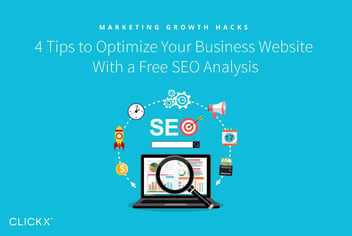3 Fatal Assumptions Small Business Owners Make When Learning SEO
There are a lot of ways to increase traffic to your small business’ website, and it’s no surprise that SEO plays a big role in that. However, many articles share tips and tricks as if SEO were dark magic—some secret ingredient that brings instant wealth and success.
Unfortunately, many commonly shared techniques include spammy and other black hat methods that ultimately hurt you in the end (even if they do spike your traffic in the short term). With all of the misinformation available, many small business owners go into SEO with the wrong idea about what it is and how it can help them.
By educating yourself as to what drives effective SEO, you can make sure to avoid these common assumptions and mistakes. In this post, you’ll learn about what the most common fatal assumptions are, and how to fix them in your own SEO practices.
Fatal Assumption #1: SEO Increases Profitability Instantly

Search engines want to provide the most recent, relevant results for their users.
However, there’s a lot of content being put online every single day. In addition to your newest blog post, there’s millions of other websites to sift through, rank in relevance, and rate in quality.
No matter how quickly your new post is found by search engines, it takes time to rise to the top.
[Tweet “Effective SEO is a slow game.”]
Effective SEO depends on providing consistent, quality content that complements an ever-growing library of reliable information. One really good post by itself won’t necessarily mean much. However, that same post, followed by a quality post every week for a year, can really take you places.
It may sound imposing, but consistently producing content for your website doesn’t have to be too daunting a task. Here’s a quick guide to getting it done.
Step One: Pick Topics That Build Your Authority
Your search engine goals as a business will always come back to one major theme, such as “Roofing Contractors” or “Painting Contractors”.
The best way to rank at the top of generic searches, such as “finding a painter”, may be to become incredibly well known for a series of much more specific topics, such as “how to choose a rustic interior paint” or “how to be your own art deco interior designer”.
By choosing specific, related topics that all build back towards your original goal, Google will begin to recognize your entire archive as a reliable source for your overarching theme. It also makes writing content far easier, as you can writing in-depth on a specific ‘micro’ topic, rather than trying to bite off more than you can chew.
Step Two: Produce Quality Content
Simply choosing a series of relevant topics to write about isn’t going to help you. You have to follow up by producing quality content on those topics.
This can take weeks and months of consistent effort and planning before you really see the fruits of your labor.
It’s tempting to get obsessed with the clicks, shares, and tweets right after posting a new article. While those statistics can be important to your marketing team, you have to understand that you’re in this for the long haul. The real results may not be visible until you’ve put in the work and built a solid library of content.
While the quality and structure of your content is important, don’t be daunted: what’s most important is that you communicate your expertise. If you don’t do that in the most appealing style, to a great extent it won’t matter. What people truly want is answers to their questions, not a work of literary art. So don’t sweat it if you’re not up there with Shakespeare; trust in the value of your expertise.
Once you’ve established that kind of a presence online, it’s hard for people to ignore.
Fatal Assumption #2: SEO Is a Button You Press to Get Better Rankings in Google
.webp?width=1024&height=683&name=seo-push-button-1024x683%20(1).webp)
[Tweet “Many people mistake SEO for some kind of seasoning, or perhaps a salad dressing.”]
Just spritz a little on the website, and it’s ready to go.
You can’t simply apply SEO as if ‘search engine friendly’ were a setting on your website. There are plugins to help you with SEO, but they aren’t performing magic. You have to create a strategy and follow through with the tools made available to you.
Think of it this way: SEO is the nail that keeps everything together, plugins are the hammer that pushes the nail into place, and you are the arm that swings the hammer. You choose where to put the nail, and apply the right force at the right time.
In other words, SEO is the way you write content, it’s the way that you word headlines, choose permalinks, write meta descriptions, choose blog topics, group posts together on a site, create categories or tags, and so on. Every step of running a website involves actively applying your personal SEO strategy.
This also means that you may need to regularly review your existing content to make sure it fits your current SEO goals. To keep with the metaphor: Sometimes, the nail got bent, or was simply applied in the wrong place.
Example #1: Update past content to keep it evergreen. Perform a content analysis of your most visited posts.
Example #2: As time goes on, you’ll become more focused and develop a better sense of how to write better content to drive sales and build your authority. You may want to update existing content for better results.
Fatal Assumption #3: SEO Is All About Serving Search Engine Robots
When search engines first came to popularity, the technology relied on basic archiving techniques by ‘bots’—the little robots that read your website and logged its relevant information for later search results.
It was easy to fool those old bots by simply using your favorite keyword over and over again throughout your website. The poor bots didn’t know that the content was spam and completely unreadable for humans.
Nowadays, search engines borderline on Artificial Intelligence, with complex algorithms striving to provide the intuitive types of results you would get if a human had all this knowledge available to their brain.
Because of this, SEO leans more towards organic, naturally written content with every day.
SEO is writing content that considers the limitations of search engine technology, while staying relevant for a very human audience.
Conclusion
Misunderstanding SEO can severely limit the reach that your small business’ website has.
By understanding these basic concepts—that SEO is not built in a day, it requires upkeep and attention, and needs to be written with humans as the focus—you can create SEO strategies that provide long-term results, not just temporary spikes in traffic (or worse, get your site removed from search engines altogether).
Which of these assumptions do you see most often? Were you guilty of any of these when you first started? Tell us your stories and how this impacts you in the comments below!
Image credits: Wikimedia, 401k Calculator




